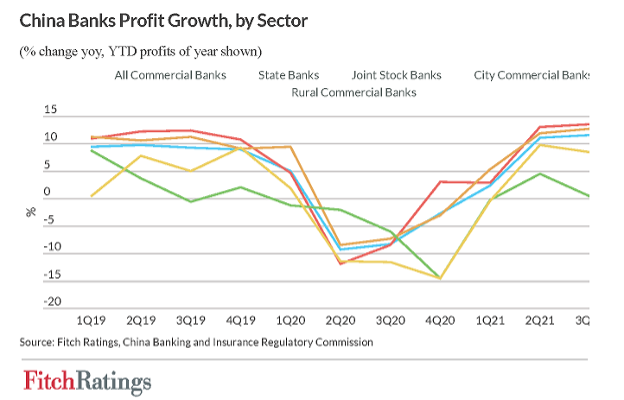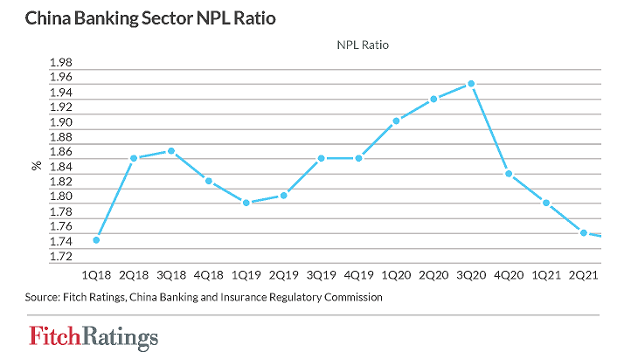The current situation with China’s banks
China’s banks located in the central provinces are facing a financial crisis that could have a serious impact on the rest of the nation. The cause of the crisis is a real matter of concern for China’s depositors.

China’s banks located in the Henan and Anhui Provinces are facing a serious financial crisis that is costing depositors their life savings. At least six banks have had accounts frozen in which customers do not have access to their funds. Depositors and people in these central provinces are panicking and deeply distraught at not being able to withdraw their money nor even obtaining news as to when they will get their funds.
For many people in these central rural provinces, having deposits in a bank was regarded as a safe, secure way to get some type of return on their hard-earned money. But their money has been frozen since the middle of April of 2022 and they are protesting at their bank branches in order to make their voices heard and hopefully have access to their cash. However, these depositors are not getting any assistance from these closed banks nor from China’s central bank or its government. The protests have occurred at the central bank branch but they have been met with stiff resistance from men dressed in white shirts. This situation could have serious ramifications for the rest of the nation’s banking system if things get worse.
The current situation
On Sunday, July 10th a large group of very angry Chinese bank depositors staged protests at the entrance of a branch of China’s central bank, the People’s Bank of China, in the city of Zhengzhou located in Henan Province, located approximately 380 miles or 620 kilometers southwest of the capital city of Beijing. The protestors were some of the thousands of depositors who have accounts at six rural banks located in the Henan and nearby Anhui Provinces. They have wanted to withdraw their moneys since when they found out through reports in the media that the leader of the banks’ parent company had fled and is wanted for financial crimes.
What makes the situation worse is that a Covid-19 tracking app for many who set out for Zhengzhou found that their health status had changed on the app to red which would not allow them to travel. The red status on the tracking app meant the protestors could not enter train stations, buildings, or hotels. Police and men in plain white T-shirts met the protestors and rushed, hit and beat them.
There are six rural banks that have had their accounts frozen since mid-April:
- Yu Zhou Xin Min Sheng Village Bank (Xuchang City, Henan Province)
- Zhecheng Huanghuai Bank (City of Shangqui, Henan Province)
- Shangcai Huimin Rural Bank (Zhumadian City, Henan Province)
- New Oriental Village Bank (City of Kaifeng, Henan Province)
- Huaihe River Village Bank (Bengbu City, Anhui Province)
- Yixian County Village Bank (Huangshan City, Anhui Province)
These banks sent out announcements to its customers in April that they were suspending their services involving online and mobile banking because of an upgrading of their systems. When depositors received word of this, they went to their local branches in order to retrieve their money, but were told they could not.
Three of the banks – Yu Zhou Xin Min Sheng Village Bank, Shangcai Huimin Riual Bank, and Zhecheng Huanghuai Bank – have frozen 10 billion yuan in deposits or $1.49 billion in U.S. dollars which has affected more than one million customers. Some reports have more than 39 billion yuan or $6 billion U.S. dollars that appear to be frozen. These customers include both China’s rural population and across the country who were putting money with these banks online in order to receive higher interest rates.
China has an insurance program designed to protect depositor’s funds that was started in 2015 and will guarantee each depositor to a maximum of 500,000 yuan. But there are numerous concerns with this insurance program including possible lack of banks funds to cover each depositor’s account. There is also a lack of transparency by the banks since they do not make their financial data available on their websites or other media platforms. Authorities from Henan have recently agreed to make payments of 50,000 yuan, $7,434 in U.S. dollars, to depositors while any amounts exceeding that will eventually be repaid yet no timeline was given.
Why is this happening
There are a number of reasons for this financial crisis in China’s banking system. First and foremost, why this situation is occurring is that China’s banking system lacks proper regulatory and enforcement of its rules and regulations. Gary Ng, an economist based in Hong Kong at the French investment bank Natixis, states that, “The most apparent problem is rural banks have poorer governance. The consequences may be amplified with poorer profitability and solvency.” Rules and regulations are not effective if they have no teeth and poor governance of China’s banking laws make this situation a bad situation that was bound to happen sooner or later.
The problem with China’s rural or village banks is that they have weak or ineffective corporate governance which results in diminished transparency and quality levels for their shareholders. This allows management to run the village banks in a poor manner and expose them to many risks especially when dealing with China’s speedily declining housing market.
Another problem is that there is fraudulent activity by the Henan New Fortune Group which is the biggest shareholder of the banks located in the Henan Province. There is suspicion that the New Fortune Group has colluded with those working in the banks in order to misappropriate the bank’s moneys. The problem here is that depositor’s funds may never have reached the bank or were taken illegally without any sort of accountability by people working in the institutions. Henan New Fortune Group is also being accused by the China Banking and Insurance Regulatory Commission of illegal use of third-party platforms as well as fund brokers in order to entice depositors, through the promise of higher interest rates, from different parts of the country.
Still another factor that contributed to China’s latest banking crisis is the increase of risky financial products involving the ever-expanding fintech segment of the financial system. In 2021, China’s central government disallowed banks from making available for sale depository products through online third-party platforms. These were regarded as “illegal financial activities” by the People’s Bank of China. The problem here is that third party online platforms were permitting these banks in the rural provinces to find a loophole regarding geographic restrictions and give them the ability to expand their markets throughout China without any hindrances. Companies that are regarded as tech giants in China, such as Baidu and JD.com, were able to sell deposit products on their platforms. This allowed rural banks to avoid regulatory road blocks and sell their depository products in parts of China where they normally could not.
As stated by Frank Xie, an expert on the Chinese economy, “The central government regulators seem to be incapable of enforcing those regulations aimed at preventing this kind of bank run from occurring. Perpetrators such as the person stealing millions from the depositors get shielded by accomplices in governments and in the upper-level management of the banks.”
These are only a few of the reasons why China’s banking crisis is in a severe state. Other factors include corruption, organized crime influence, effects of the Covid-19 pandemic, global politics, and domestic turmoil from the real estate industry. Put them altogether and they spell trouble for China’s macroeconomy.
What this means to China’s economy
The current banking situation in China has several implications for its economy and possibly the world.
First, the protests in the Henan Province could be regarded as a “run on the bank” an event that has not been seen for a while. With depositors making demands on these rural banks to get their money back, it can be a reminiscence of the run on the banks that occurred in the early 1930’s in the United States during the early years of the Great Depression. This could also be seen as a type of financial contagion that is starting in China’s rural areas and advance to its major cities in a relatively short time. Bad news can travel very fast especially when it deals with the safety and security of one’s funds being held in a bank.
Secondly, China’s macroeconomy is already in perilous shape since the central government is reaching out to state-owned policy banks for assistance. Beijing has ordered the state-owned policy banks to come up with 800 billion yuan, $120 billion in U.S. dollars, for funding for infrastructure projects. With China’s economy experiencing serious contraction, President Xi Jinping is calling for drastic measures in order to increase spending on infrastructure projects in 2022 as a method to boost the nation’s economy through an increase in public investment. China’s economy needs a significant infusion of cash in order to help it experience economic growth. Hopefully, this will create much needed jobs and eventually see a rise in China’s gross domestic product (GDP).
Third, this will have an impact on China’s troublesome real estate sector. China has seen a significant growth in its reliance on real estate as a measure of economic growth. China’s national account statistics state that the combined share of GDP for real estate services and construction saw a large increase from 10 percent in 1995 to approximately 14 percent in 2020. As far as residential real estate is concerned, it has also seen an increase as an investment asset in the last 25 years. Residential real estate is now approximately 10 percent of China’s GDP while overall investment in real estate is somewhere around 13 percent of GDP. Many owners of real estate, whether for a home or for investment purposes will obtain a bank loan in order to finance the purchase through a mortgage. The problem is that if the nation starts a downward slide, then many of these borrowers will more than likely default on their mortgages. This will cause more banks to get into serious financial trouble and possibly lead to an expanded contagion in China.
Fourth, this situation is a clear sign that the rural banks as well as government regulators are not taking into consideration the needs, concerns, and precarious position that regular, everyday citizens in the rural China find themselves in. There has been substantial increase in the systemic risk that Chinese banks are involved in that could have detrimental effects on their depositors. The banks in the Henan and Anhui Provinces were involved in schemes that put depositor’s moneys at risk mainly due to the indifference and lax controls by bank regulators. The dilemma is that these regulators should have been keeping a watchful and sharp eye on where depositor’s funds were going and that they should not have been gambled on risky investments in which the chances of loss were high. Chinese banks have been known to offer their clients wealth management products that were extremely risky and offering high yields while touting that they were safe and an attractive alternative to savings accounts that had low returns even though they could be regarded as safe. The great unknowns are where these funds went, why was there such lax control, and how much collusion was there between regulators and bank management?
What will happen next?
China’s banking crisis could have serious implications for the nation unless things change. There must be stricter controls by regulators in which they must enforce the laws that now exist. It may also be necessary to enact new laws and regulations that are stricter than the ones now being used. The new and existing laws must have teeth that will have a deep and painful bite when they are broken by banks and their management.
China desperately wants to expand its economy in as short a time as possible so that it can be the world financial power. But if Beijing fails to keep a serious eye on its banking and financial system, it will take China longer than expected to reach its goal. Also, its reputation among other nations will be severely tarnished and its credibility will be lost.
But worst of all, the Chinese banking system will have lost all trust, faith, and credibility from its own people. These are really the ones who will benefit from such fully executed and enforced laws that will ultimately help the Chinese economy grow and prosper in the long run.






